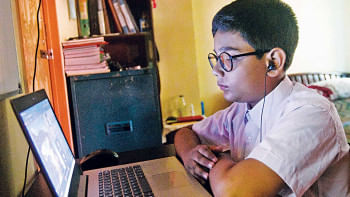Smartphone addiction in children: How are parents responsible for it?

Addiction to digital devices, particularly mobile phones, has been a grave concern in recent years. Everyone, from children to older people, cannot think of spending a moment without electronic gadgets – be it for playing games, watching movies, or scrolling through social media feeds. People nowadays are suffering from a condition called "nomophobia," or the fear of being without one's cell phone.
Recently, I returned home from work to find my whole family using their respective mobile phones while sitting on a bed together.
After a while, I joined them. My sister spoke to me briefly, but we did not have any eye contact while talking.
I believe this is the typical daily case for most of us. However, we rarely even think too much about it. Even those who care seem not to pay attention to these issues within their own lives.
We often blame our children for being addicted to mobile phones, but what about us? What are we doing differently? It is up to adults to start spending less time looking at screens at home. When my nephew sees me reading books or writing something, though he cannot read or write, he still gets out a pen and paper for himself. He draws whatever he likes, but at least he does not use mobile devices. So, if we want our children not to use mobile phones excessively, we should stop doing it first.
In most cases, parents' obsession with mobile phones affects children directly, causing secondhand obsession. Again, it may expose technology-based interruptions in parent-child interactions.
It has been a common scenario that we first introduce mobile phones to our children, so they do not irritate us when we are otherwise engaged. We do so to distract them while they eat as well, to avoid any fussy behaviour. Hence, children become addicted to mobile phones.
Essentially, we do not want to spend much time with our children, which results in addiction to mobile phones. However, while blaming our children for it, do we ever realise that we are responsible for it? The earlier we recognise our faults, the faster a solution will come about.
According to a World Health Organization recommendation, a digital gadget, mobile phone, laptop, or phone should never be within the reach of a child younger than one-year-old. Children between ages two and five could use their phones for one hour daily.
But, let alone following the guidelines of the WHO, it is more concerning how most of us don't even know about them. The research also found that most parents do not bother at all to halt the growing habit of their children of using smartphones. In many cases, they are happy to see their children's different abilities when using a smartphone. Most parents do not find anything wrong with this preoccupation with technology and social media and go on to ignore the harmful effects of too much screen time on their kids.
So, before claiming that the situation is out of control and that children are bound to be addicted to mobile devices, we must consider what effective interventions we are taking to end this addiction.
Md Sohrab Hossen is senior research assistant at Brac James P Grant School of Public Health, Brac University. Reach him at [email protected]

 For all latest news, follow The Daily Star's Google News channel.
For all latest news, follow The Daily Star's Google News channel. 










Comments